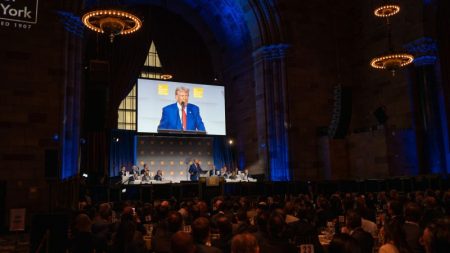Sir Keir Starmer has declared a historic Labour victory in Britain’s general election, urging the country to embrace “the sunlight of hope” as he secured a huge House of Commons majority of at least 168 seats.
Outgoing prime minister Rishi Sunak conceded his Conservative party had suffered a devastating defeat, as it sank to its worst-ever result. The Tory vote was decimated by Nigel Farage’s populist Reform UK.
By 9am, Labour had won 410 House of Commons seats out of 650 with only five left to declare. The Tories were predicted to crawl to 122 seats, less than a third of their previous total.
It was a historic Labour victory — the party last won an election in 2005 under Sir Tony Blair — but Starmer will become Britain’s new prime minister knowing that Labour’s public support is shallow.
The party was set to win power with about 34 per cent of the national vote, the lowest-ever winning share and only 10 points higher than the Conservatives. Before the vote, polls put Labour 20 points ahead.
“We can look forward again,” Starmer told party activists at London’s Tate Modern at 5am. “Walk into the morning — the sunlight of hope, pale at first, but getting stronger through the day.”
In a highly symbolic moment, former prime minister Liz Truss was among the big Tory names to lose their seats. Her 49-day premiership, and the economic havoc it spawned, contributed to the Conservative meltdown.
Labour’s performance is a personal triumph for the former chief prosecutor, who became the party’s leader in 2020 after its worst postwar election defeat. His victory is similar in scale to Blair’s 1997 Labour landslide.
But the party’s success was delivered on a vote share that was much smaller than the 40 per cent secured by leftwing Labour leader Jeremy Corbyn in his 2017 general election defeat.
Labour won scores of seats because of the rise of Reform UK, which split the rightwing vote, punishing the Conservatives under the UK’s first past the post electoral system.
“This looks more like an election the Conservatives have lost than one Labour have won,” pollster Sir John Curtice told the BBC.
Speaking at his count in Clacton, Reform’s leader Nigel Farage said his party would come second in swaths of seats as well as securing a “bridgehead” in parliament, adding: “This is the start of something that is going to stun all of you.”
Turnout was on course to be about 60 per cent, close to a record low, suggesting general public dissatisfaction with mainstream politics.
Starmer admitted that he faced an immediate task of reconnecting mainstream politics to voters. “The fight for trust is the battle that defines our age,” he said.
French President Emmanuel Macron congratulated Starmer on his victory on Friday, saying he was “pleased” with his first discussion with the new Labour prime minister.
“We will continue the work begun with the UK for our bilateral co-operation, for peace and security in Europe, for the climate and for AI,” he said in a post on X.
Former US president Donald Trump wrote on his Truth Social platform: “Congratulations to Nigel Farage on his big WIN of a Parliament Seat Amid Reform UK Election Success. Nigel is a man who truly loves his Country!”
As of 9am, Labour had secured 34 per cent of the vote, the Conservatives 24 per cent, Reform 14 per cent and the Liberal Democrats 12 per cent.
By that time Labour had won 410 seats, the Conservatives 119, the Lib Dems 71 and Reform four.
The centrist Lib Dems’ tally smashed the party’s modern-era 62-seat record in 2005, as it made big gains in the Tory “blue wall” of well-heeled seats in the south of England.
The Scottish National party was behind Labour in Scotland with an expected 10 seats, delivering a hammer blow to the party’s dream of securing independence.
Sunak called it a “sobering” result, while outgoing chancellor Jeremy Hunt, who narrowly held his own Surrey seat, called it a “crushing defeat”.
But Hunt added that Starmer and shadow chancellor Rachel Reeves were “decent people and committed public servants who have changed the Labour party for the better”. He urged them to reform the NHS, adding Labour might be better placed than the Tories to achieve that goal.
Among the high-profile Conservative casualties on a night of Tory desolation were Grant Shapps, defence secretary; Penny Mordaunt, leader of the Commons; Gillian Keegan, education secretary; Sir Jacob Rees-Mogg, former cabinet minister; and Alex Chalk, justice secretary.
Corbyn held his Islington North seat, standing as an independent, while George Galloway, the leftwing pro-Palestinian MP for Rochdale, lost his seat to Labour.
But Labour lost four seats — including one held by shadow cabinet member Jonathan Ashworth — to pro-Palestinian independent candidates, an indication of how Starmer’s position on the Israel-Hamas war has hurt his party among many Muslim voters.
The Green party also won all its four target seats in the general election, quadrupling the number of MPs it will send to Westminster and bringing its total in line with Reform UK.
Starmer becomes only the seventh Labour prime minister in the party’s history. He will move into 10 Downing Street on Friday and immediately form his cabinet, with an instruction to ministers to quickly deliver policies to jolt Britain out of its low-growth torpor.
Starmer’s avowedly pro-business agenda appears to have paid off, as Labour bucked international political trends. Far-right parties have performed strongly in recent European and French elections, while Donald Trump is leading in polls for the US presidential race.
Chancellor-in-waiting Reeves has said she hopes investors will now see the UK as a “safe haven”.
Starmer has promised to work with business to stimulate growth, with an agenda that includes planning reform and state investment in green technology. Labour will also pursue a traditional agenda of reforms to worker rights.
For Sunak, it was a personal disaster. He chose to hold an early election — against the advice of his campaign chief Isaac Levido — and ran an error-strewn six-week attempt to turn around his party’s fortunes.
The Conservatives’ projected total of 122 seats is lower than the party’s worst-ever result of 156 in 1906. Starmer’s expected seat haul is close to the 418 seats won by Blair in his 1997 landslide victory.
Read the full article here



